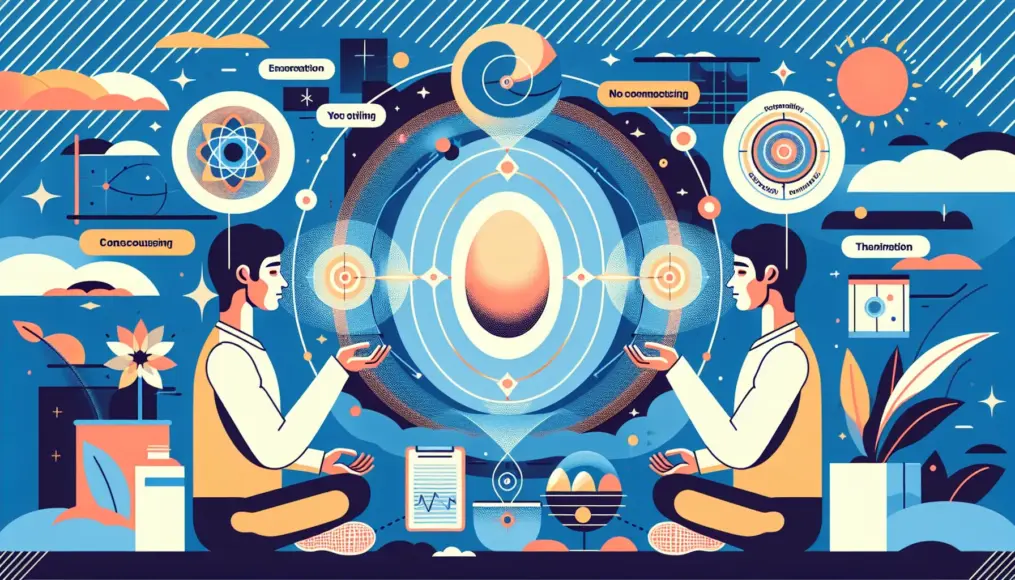Feeling mentally exhausted is a common struggle for many people in today’s fast-paced world. The pressures of work, studying, and everyday stress can leave both our minds and bodies feeling drained. However, this is where meditation can come to the rescue. It’s a fantastic way to reset your mind and relieve that mental fatigue.
In this article, we’ll delve into the causes and symptoms of brain fatigue, and explore why meditation is such an effective remedy. We’ll also share some easy-to-implement meditation techniques and tips for making it a regular part of your routine. So, let’s discover how you can carve out some relaxing moments for yourself.
- In-depth explanation of the causes and symptoms of brain fatigue
- The positive effects of meditation on mental exhaustion
- Simple meditation techniques and tips for building a habit
What is Brain Fatigue? Causes and Symptoms
Brain fatigue is a common issue that many people face in today’s fast-paced society. Everyday stresses from work, school, and interpersonal relationships can lead to excessive fatigue in our brains. This kind of fatigue can diminish mental performance, affecting focus and memory. Therefore, understanding the causes and symptoms of brain fatigue is essential.
To alleviate brain fatigue, it’s crucial to first identify its causes and gain insight into your own condition. In this section, we’ll delve into the primary causes of brain fatigue and how to recognize its symptoms.
Causes of Brain Fatigue
There are several factors that contribute to brain fatigue, with stress, lack of sleep, and overwork being the most prevalent. When mental pressure from work or study increases, the brain often remains in a state of tension, making it more susceptible to fatigue. Additionally, not getting enough sleep or engaging in prolonged tasks can place a significant burden on the brain. These factors combine to trigger brain fatigue.
Furthermore, diet and a lack of exercise can also impact brain health. If your nutrition is lacking or if you lead a sedentary lifestyle, you may experience diminished brain function and an increase in fatigue.
- Stress and sleep deprivation are primary causes of brain fatigue
- Mental strain impacts the brain significantly
- Diet and lack of exercise are contributing factors
How to Identify Symptoms
Symptoms of brain fatigue can vary from person to person, but typically include decreased concentration, sluggish thinking, and irritability. If you find that tasks you once handled easily now feel challenging, or if you’re getting stressed over minor issues, these could be signs of brain fatigue.
Physical symptoms, such as headaches and general tiredness, may also arise. If you notice these symptoms, it’s important to take action promptly. Incorporating relaxation techniques, like meditation, can help give your brain the rest it needs.
Integrating relaxation methods is particularly effective in reducing brain fatigue. Meditation, in particular, can calm the mind and alleviate stress. If you’re interested, check out this article on “Boosting Serotonin with Meditation: How to Incorporate It into Your Daily Life” for specific meditation techniques and their benefits.
- Decreased focus and sluggish thinking are common symptoms
- Minor irritations may become more pronounced
- Pay attention to physical fatigue and headaches
Why Meditation is Effective for Brain Fatigue
Meditation is widely recognized as an effective way to promote relaxation for the mind and body, alleviating brain fatigue in the process. When brain fatigue accumulates, it can lead to decreased concentration and judgment, as well as increased stress levels. Therefore, it’s essential to understand how meditation positively impacts the brain. In this section, we will delve into how meditation affects brain waves and its effectiveness in reducing stress.
Engaging in meditation helps create a state of relaxation, allowing the brain to return to its normal functioning. Notably, positive changes in brain wave patterns can lead to improved mental stability and concentration.
The Impact on Brain Waves
Scientific evidence shows that meditation alters brain wave patterns. Specifically, during relaxation, there is an increase in alpha waves, which enhances feelings of calmness and concentration. These alpha waves help clear thinking and reduce stress, making them beneficial for alleviating brain fatigue.
Additionally, during meditation, the brain’s theta waves become more active, which is linked to enhanced creativity and inspiration. This refreshing effect enables the brain to process information more effectively.
- Meditation changes brain waves, increasing alpha waves
- Alpha waves enhance relaxation and concentration
- Meditation boosts creativity and inspiration
Stress Reduction Benefits
Meditation is a highly effective technique for reducing stress. When practiced regularly, it can lower heart rate and blood pressure while easing muscle tension. As a result, it helps suppress the release of cortisol, the stress hormone, making it easier for the mind and body to relax.
Moreover, consistent meditation practice increases resilience to stress, allowing individuals to manage daily stressors more effectively. Ultimately, this contributes to reducing brain fatigue and maintaining mental well-being.
If you’re interested in learning more about the benefits of meditation, check out this article on “Enhance Your Life with Meditation and the Law of Attraction.” It provides specific steps to harness your inner strength through meditation and create the life you desire, so be sure to take a look!
- Meditation lowers heart rate and blood pressure
- Suppresses the release of stress hormones
- Increases resilience to stress and makes management easier
Easy Meditation Techniques for Everyday Life
Meditation is a fantastic way to relieve brain fatigue, but many people find it challenging to incorporate into their daily routines. The good news is that there are plenty of simple meditation methods you can start right away. In this section, we’ll introduce easy meditation techniques that you can practice immediately, along with some beginner-friendly steps.
Even amidst the hustle and bustle of daily life, you can refresh your mind and ease mental fatigue with short, accessible meditation practices. So, let’s explore the meditation styles that might resonate with you!
Simple Meditation Techniques
Let’s kick things off by looking at some straightforward meditation techniques. One highly recommended method is “breath meditation.” This technique involves focusing your attention on your breath, which helps calm your mind. Close your eyes, take deep, slow breaths, and tune into the sensations of your breathing.
Another popular option is “mindfulness meditation.” This practice encourages you to be present in the moment, accepting your feelings and thoughts without judgment. It’s an effective way to reduce stress and promote a sense of calm.
- Calm your mind with breath meditation
- Focus on the present moment with mindfulness meditation
- Techniques you can practice in a short amount of time
Beginner-Friendly Meditation Steps
If you’re new to meditation, don’t worry! Here are some steps to help you get started with ease. First, find a quiet place to sit and adopt a comfortable position. It’s best to start with just 1 to 5 minutes of practice.
Next, close your eyes and take a deep breath, focusing on the sensations of inhaling and exhaling. If thoughts start to pop up, acknowledge them and gently guide your attention back to your breath. By repeating this process, you’ll gradually become more accustomed to meditation.
- Relax in a quiet place
- Start with just 1 to 5 minutes
- Practice focusing on your breath
Tips for Making Meditation a Habit
Meditation is highly effective in reducing mental fatigue, but many people find it challenging to incorporate it into their daily lives. Therefore, it’s crucial to think about ways to make meditation a regular part of your routine. In this section, we’ll explore methods to seamlessly integrate meditation into your life and tips for maintaining a consistent practice.
By gradually incorporating meditation into your daily routine, you can support your mental well-being and prevent mental exhaustion. Let’s take a look at some simple strategies.
Integrating Meditation into Daily Life
To blend meditation into your everyday life, it’s effective to incorporate it into your established routines. For instance, dedicating a few minutes to meditate after waking up or before going to bed can be very beneficial. By setting aside specific times for meditation, you can naturally develop a habit of practicing it.
Additionally, incorporating short meditation sessions during your commute or while on the go is highly recommended. Simply closing your eyes and focusing on your breath while on the train or bus can provide a great relaxation effect. By taking advantage of these small pockets of time, you can make meditation an integral part of your life.
- Set aside specific times in the morning or before bed
- Include short meditations during your commute
- Utilize spare moments effectively
Tips for Consistency
The key to maintaining a meditation practice is to go at your own pace without forcing yourself. Start with short sessions and gradually increase the duration as you feel more comfortable. Also, paying attention to how you feel physically and emotionally after meditating can boost your motivation.
Moreover, meditating with friends or family can be incredibly effective. Sharing meditation time with loved ones can inspire and encourage each other, making it easier to stick with the practice. Find a method that works for you, and enjoy the journey of meditation.
- Go at your own pace without forcing it
- Be mindful of the changes you feel after meditation
- Meditate with friends or family
Conclusion
Brain fatigue is a common issue many people face in today’s fast-paced society, but meditation offers a promising way to alleviate it. By helping to regulate brainwaves and reduce stress, meditation can play a vital role in maintaining mental health when integrated into daily life. With some simple techniques and a few adjustments to your routine, anyone can easily start a meditation practice.
Moreover, making meditation a habit can activate your brain’s functions, enhancing your focus and cognitive abilities. So, take the time to find a meditation style that resonates with you and try to incorporate it into your life for a refreshing mental boost.
- Meditation can help reduce brain fatigue
- Simple meditation techniques can be easily integrated into daily life
- Consistency promotes mental well-being
By adding meditation to your everyday routine, you can cultivate a richer state of mind. We would love to hear about your meditation experiences and thoughts, so please share them in the comments!



Comment